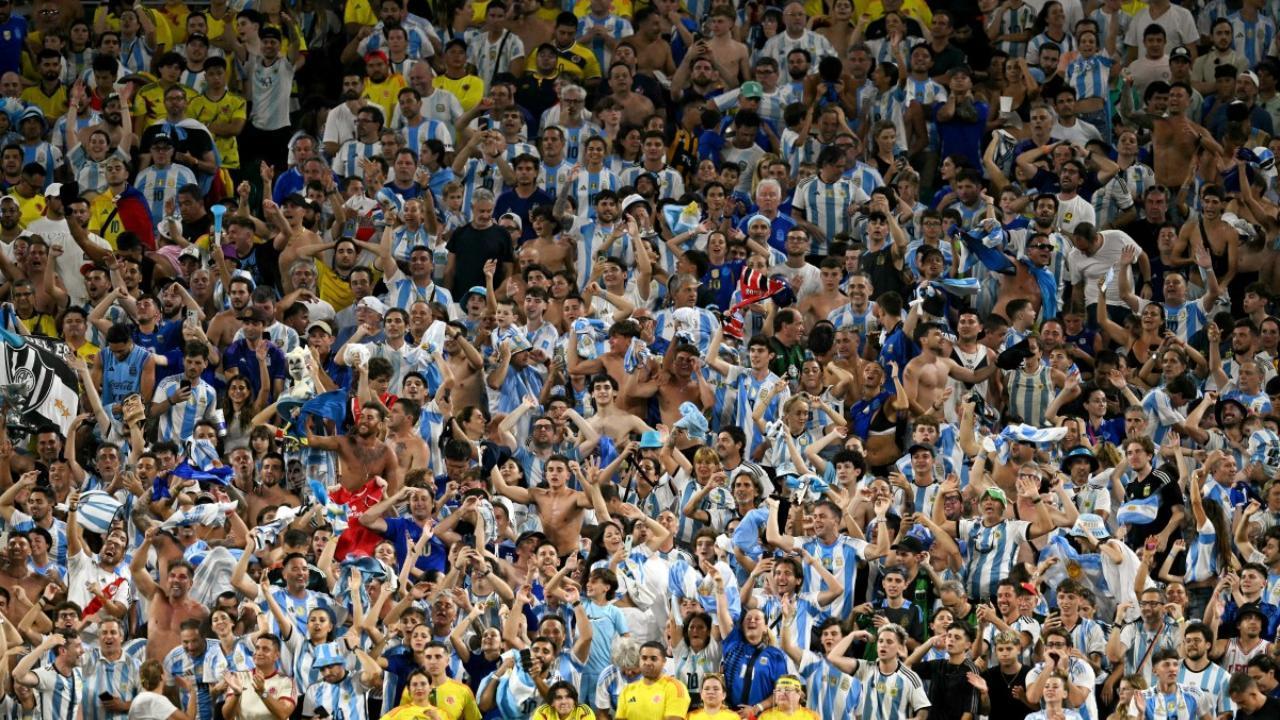
As the game kicked off at Miami’s Hard Rock Stadium, an extraordinary hush swept across Buenos Aires. Restaurants closed their doors, streets emptied, and the sprawling city took on an almost surreal tranquility. Argentina was about to experience a profound moment of respite—if only fleeting—from its current crises as the national soccer team battled for glory in the Copa America final.
Just as Argentina’s forward Lautaro Martinez scored the opening goal, brilliantly capturing the jubilant essence of the game, a photograph by AFP captured a critical snapshot for millions of Argentines clinging to this moment of joy. Celebrations erupted after Argentina’s 1-0 win against Colombia in extra time. The victory marked the nation’s third consecutive major tournament win, sending waves of euphoria throughout Buenos Aires, particularly around the iconic obelisk.
Nineteen months ago, Argentina experienced a similar outburst of national pride with their World Cup victory that saw millions converge into Buenos Aires’ downtown square, reveling in collective celebration. Diego Cáceres, a 38-year-old fan, reminisced about that day as ‘glorious’. Reflecting on Sunday’s festivities, even amidst economic adversity, Cáceres said, “This is beautiful, too. But it’s a cherry-on-top, or a reminder. It makes me want to go back in time.”
Argentina’s economic conditions have dramatically deteriorated since then. Currently, the country faces annual inflation soaring above 270%, with nearly 60% of its 45 million people living in poverty. The high-stakes anxieties stemming from anti-government protests, labor strikes, and drastic economic measures under President Javier Milei, a self-professed ‘anarcho-capitalist,’ add layers of distress. Headlines scream tales of the peso plunging to unprecedented lows against the dollar, devaluing savings and heightening fears of further economic collapse.
For Cáceres, a shift in his fortunes has been particularly harrowing. Employed as a cook and renting an apartment during the last World Cup, he now finds himself unemployed and homeless. “Everything is horrible now,” he lamented as he joined the celebratory crowds. “Just when you think things can’t get more expensive, they do.”
Adding a touch of superstitious humor to the somber reality, some Argentines quip about paying a ‘steep price’ for the 2022 World Cup victory, alluding to the crises that ensued afterward. “Has anyone checked the terms and conditions of winning the Copa América?” read a widely shared post on X, reflecting a blend of skepticism and dark humor surrounding the tournament’s impact on the country’s fate.
Regardless, the Copa America trophy has provided the kind of emotional lift Argentines sorely needed. For many, it offers not just another tick in the win column but a cherished escape from daily struggles. Erika Maya, a 47-year-old homeless mother of six, summed up the collective sentiment as she looked through the glass of a locked restaurant to catch glimpses of the match.
. “It’s our best entertainment, that’s what makes it so important. You can forget everything that’s going on and just enjoy.”
The nation has found solace in their beloved national team led by Lionel Messi. For 24 days, soccer fans were drawn into an obsessive fervor, watching every match with bated breath. 21-year-old soldier Fabrizo Diaz, who watched alongside his girlfriend, said, “Football is the fruit of our society; it’s what we’re proud of, it’s what we give to the world.”
The drama soared alongside the game, with Buenos Aires falling eerily silent as citizens huddled around their televisions, similar to the undercurrent of a COVID lockdown. Messi’s possible retirement has intensified emotions, with the 37-year-old captain’s ambiguous statements fueling waves of nationwide hope and despair. “I believe Messi is going to continue,” commented 32-year-old Adrian Vallejos, who watched with his wife and son. “I don’t know if he’ll make it to the next World Cup, but this is not the end.”
Messi’s journey through the tournament has been physically taxing, marked by persistent leg injuries. Nevertheless, his refusal to rule out participating in the 2026 World Cup during an ESPN interview offered a collective sigh of relief to many. Alejo Levoratti, a sports sociologist at Argentine research institute CONICET, remarked, “We’re at a very poignant transition for this team. It’s only at the point of his retirement that Messi arrived at his best moment and found this connection with his team, this communion with Argentina.”
Adding to the emotional weight was Ángel Di María’s announcement that Sunday’s match would be his last. The moment was filled with nostalgia as he left the pitch to a standing ovation after Argentina’s pivotal goal. “I dreamt of retiring like this,” Di María expressed to reporters.
Argentina’s national team has provided a beacon of light amid years of dark economic and social turmoil, charting a path of victories in the 2021 Copa América, the 2022 inaugural Finalissima match, and the 2022 World Cup. The success has repeatedly revived national pride in a troubled country.
President Javier Milei, an erstwhile professional soccer goalie, expressed his congratulations in an enthusiastic all-caps message on X: “WE ARE CHAMPIONS AGAIN…!!!” The victory provoked spontaneous celebrations in downtown Buenos Aires, a site recently occupied by numerous protests. National pride seemed momentarily renewed as friends and strangers draped in Argentine flags and jerseys hugged and celebrated, singing ‘Muchachos’, the unofficial anthem of the 2022 World Cup, and chanting Messi’s name.
(With agency inputs)










